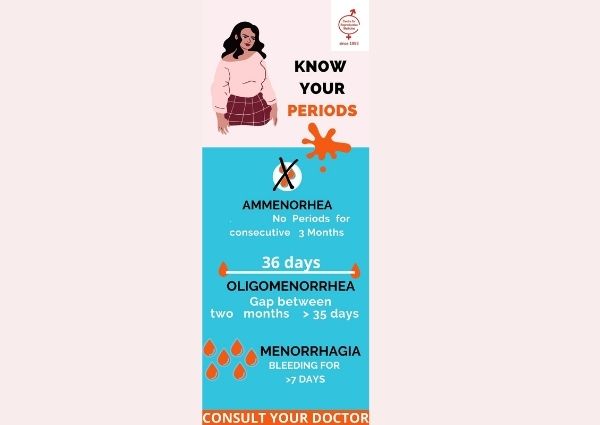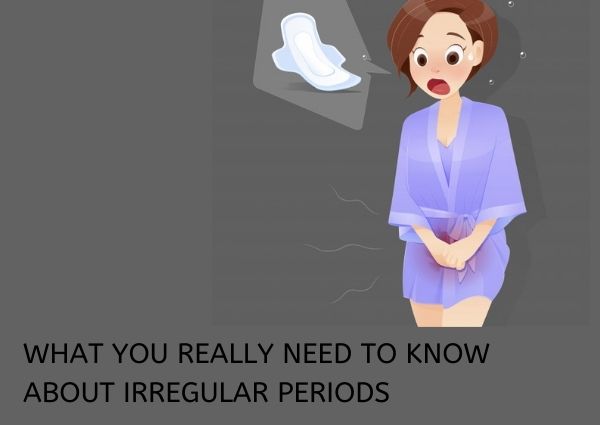WHAT YOU REALLY NEED TO KNOW ABOUT IRREGULAR PERIODS
You may have heard that a standard or normal cycle is between 28 to 30 days and it should last for about 4 or 5 days at max. This may actually be true for a few people only, but in reality periods can vary a lot from month to month or person to person and still be considered quite normal.
The most crucial thing for females to understand is that your period as well as your regularity is different from other people. Here’s what you really need to know about what’s normal and what’s not.
The cycles that last as few as 21 days or as long as 35 days are normal. In terms of length, a normal period may lasts between two and 7 days.
Around 14 % women face irregular periods according to AAFP.¹ Definition of Irregular periods may be different for everybody.
If your periods start before 21 days from the date of your last bleeding finished or comes after a gap of more than 35 days then it should be considered abnormal cycle. If it happens for more than 3 months consequently than you have irregular periods. Furthermore if your cycle gap varies by more than 20 days from month to month you seek medical advice.²
So if you ever occasionally skip a period or your period comes a little late some months, there’s probably nothing to really be worried about. Still, if you’re actually thrown off by your period’s irregularity and really want to get a better sense for any patterns, you can contact your doctor.
A lot of individuals use period tracking apps, which is quite helpful to understand what’s happening with their cycle and also the duration.
Furthermore we can label menstrual periods irregular in terms of gap between two cycles (too long or too short), number of days of menstrual bleeding (< 2 or >7 days) and/or flow of bleeding (very scanty or very heavy bleeding)
Maybe you used to get quite a heavy flow during your periods, but now they’re lighter. Or maybe some periods are lighter and others are a bit heavier. This is usually pretty normal for everybody. Your PMS symptoms (or lack thereof) can also vary each cycle, depending on hormone fluctuations.
It’s not uncommon for your period to become shorter as you grow old. In adolescence, periods tend to be longer and a bit heavier, and then ease up after a couple of years. Menstruation changes in the years before menopause and may be more irregular after pregnancy.

Many things can cause irregular periods.
During times of your life that are more stressful, your periods tend to be more irregular. This could actually mean it may be delayed or even skips a month. You know that stress you’ve been feeling about your new job or moving into a brand new house? It can affect the regularity of your cycle because of temporary hormonal imbalance.
Putting a lot of stress on your body because of a strict exercise regime, which sometimes happens to female athletes, may alter regularity of menstrual cycle.
Your period can change over time also as you age. An erratic pattern after age of 40plus may be perimenauposal and may sometimes last as long as 10 years.
Other conditions which will cause irregular periods include excessive weight gain or weight loss or irregular eating habits.
Breast feeding also cause irregular cycle due to high prolactin, a natural way of birth control.
Medical conditions that cause irregular cycles and need to be addressed are Thyroid disorders (both Hypothyroidism and Hyperthyroidism), Polycystic Ovarian Syndrome (PCOS) causing high levels of male hormone Testosterone and Insulin resistance, Pelvic inflammatory Disease (PID) caused due to sexually transmitted diseases etc.
If you’re experiencing fertility issues and aren’t menstruating regularly, there’s probably an underlying medical issue that you really need to address, so you need to make sure to talk with your doctor.
Birth control pills can make your period irregular — initially
Hormonal contraceptives like contraception or birth control pills and also the hormonal intrauterine device (IUD) work in order to prevent pregnancy by interfering with the natural fluctuation of hormones in your cycle that form eggs and ovarian follicles. Furthermore, this interference is what really prevents you from getting pregnant. These hormonal contraceptives and hormonal IUD also cause thinning of lining of your uterus, referred to as the endometrium, so an egg can’t attach to it. A thin endometrium actually means your body doesn’t really need to shed it as often or at all, so your period may really become much lighter or stop altogether.
Spotting or bleeding between periods can happen once you start using a new method of hormonal birth control. Plus, some people prefer to use contraception or birth control in a way that suppresses their period entirely, like taking contraception or birth control pills continuously (and skipping the placebo pills), which may also lead to spotting until your body gets used to the new routine.
However if you have spotting or bleeding between periods that doesn’t go away within a few months, or if there’s actually a sudden change in your cycle, that’s worth noting.
If you’re on an IUD and you don’t get your period, if all of a sudden you have heavy bleeding or have irregular bleeding, that’s something to ask your doctor about.
When to consult Doctor
- You don’t have periods for last three months and you are not pregnant
- You get periods within 21 days of your last date more often.
- Your periods tend to be after 35 days of gap.
- Your bleeding last for more than 7 days or flow of bleeding is unusually too heavy
- You tend to get unusual pain during periods.
- Your periods become unusually erratic.
- https://www.aafp.org/afp/2012/0101/p35.html
- Period Problems. Office on Women’s Health, U.S. Department of Health and Human Services. March 16, 2018.

